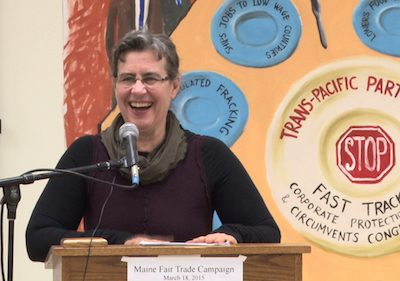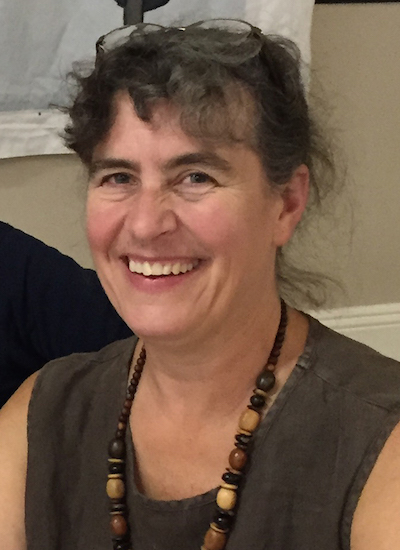Cynthia Phinney worked as a hand sewer for 12 years in Maine’s struggling shoe industry. She loved the work. She didn’t like the way she and co-workers were treated while management sent jobs overseas. They fought back and got some concessions, but it was a difficult battle without union representation.
“After that, I specifically looked for a union job because I had learned a little bit about organizing while working at a nonunion shop,” Phinney said.

|
| Manchester, Maine, Local 1837 member Cynthia Phinney speaks at the Maine Fair Trade Campaign annual meeting in 2015.
|
A local utility hired her as a customer services representative and she later became a meter reader, joining Manchester, Maine, Local 1837 in 1991. She’s left quite a mark on labor in the Pine Tree State ever since, culminating with her election as the first woman president of the Maine AFL-CIO during its convention in October. The federation represents 160 unions and more than 40,000 workers.
“She is just a tremendously balanced, smart, caring person,” said Matthew Beck, Local 1837 organizer and business representative. “I think everyone is excited that we’ve elected the first woman, but I think they’re more excited we elected Cynthia. She is so well-known and loved by the Maine labor community.”
Phinney was hired as Local 1837’s first full-time organizer in 1998 and served as business manager from 2004-10. She’s been a meter installer and reader for Central Maine Power since leaving office, but is retiring in December to begin her four-year term as president.
She said she doesn’t think gender played a role in her election, but it is a positive for Maine’s unions going forward. A woman previously was appointed to the position after a president resigned, but Phinney is the first to be elected by the delegates.
“One of the things we know is that in all of the labor movement, our real strength is in our numbers and solidarity,” she said. “The more diverse our leadership and activists are, the richer we are. That fact that I as a woman can get elected is a good thing.”
Local 1837 Business Manager Dick Rogers is one of her most ardent supporters – even though Rogers beat her in the 2010 election that put him in his current position. He said Phinney was classy in defeat, noting she went out of her way to introduce him to all companies with which Local 1837 does business.

|
| Cynthia Phinney, a former Local 1837 business manager, recently became the first woman elected to head the Maine AFL-CIO.
|
Rogers said Phinney’s organizing skills and passion for the labor movement will make her a perfect fit for the job.
“It’s what she should be doing,” he said. “We supported her in every way.”
Phinney formerly served on Maine’s Citizen Trade Policy Commission, a state government entity that examines the impact of trade agreements on the state. In 2008, she was the recipient of the Solidarity Award, presented by the 6,000-member Eastern Maine Labor Council.
She also has received the Paul A. Loughran Memorial Award, which is given to a business manager who has shown outstanding leadership in the Second District. Loughran, who died in 2002, was a journeyman wireman and beloved IBEW leader in New England who served as the Second District’s International Vice President from 1990-97.
Beck got to know Phinney when he was the shop steward at television station WGME in Portland, Maine, and led several job actions during contract negotiations with owner Sinclair Broadcast Group.
“She’s one of the most ethical and dedicated trade unionists that I’ve ever known,” Beck said. “She has a tremendously balanced world view, not just about union members, but workers in general.”
Phinney has had an adventurous spirit and a fondness for work her entire life. She grew up near Milwaukee, but moved to New England to study French at the University of Maine at Fort Kent, in the northern part of the state along the Canadian border. It’s in the heart of Acadian culture and many people in the area speak French.
She loved the experience, but realized she wanted to work with her hands and didn’t finish her degree. She now lives in Livermore Falls with her husband, Paul Wilson.
“The union movement is the best way, and maybe the only way, that workers can be effective in the impact they have on the economy,” she said. “Our well-being is set up by how well the economy is working and right now, it is set up to benefit a few. I want to help change that.”